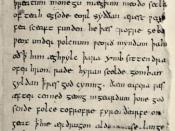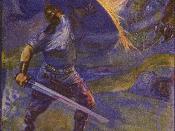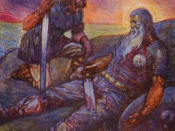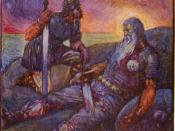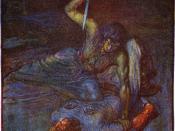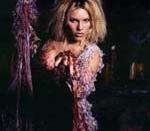Beowulf can be read in two different ways: A) as an anthropological "case study" of a primitive people, or B) as a story, a literary piece, even, perhaps, a work of art.
A) The Relic Although it is not the oldest surviving manuscript in Old English, it does represent the only sustained view of the Germanic tribes that settled England during the first millennium A. D.
To call the poem "English," however, is something of a mistake; its language is an antecedent of English and its setting is Scandinavian. An oral poem, it was probably transcribed by an "English" monk around the 7th century. (Click here to see a sample of Old English, as well as pictures of the manuscript) Its frame of reference is somewhere around the late 5th or early 6th centuries, though the quality of life it presents could be much earlier or much later.
In Beowulf we glimpse several facets of the Anglo-Saxon/Germanic customs: Mythology: Although there are many Christian references, these are thought to be primarily the insertions of the monks who transcribed the poem.
Otherwise, the world of Beowulf, refered to as "middle-earth," largely belongs to Norse myth.
Social Organization: Obviously, Beowulf lives in a warrior society, one in which the king/thane relationship is extremely important. As you read through Beowulf, note the number of occasions in which service to a king is rewarded; or, as a result of some service, a king is obligated to bestow protection or to take revenge. In addition, there is the concept of wyrgild: seeking restitution for death, injury or insult. The failure to take or to pay wyrgild can lead to expulsion from the community. Note, too, the communal structure, the way in which the mead hall is at the center, surrounded by outlying buildings. The mead hall is the "heart" of the community (Hrothgar names his hall "hart"), offering food, entertainment, and, in times of danger, shelter. The relationship of the king/thane and the place of the mead hall eventually evolve into the medieval system of feudalism.
The Scop: The scop is the singer of poetry, who serves as both an entertainer, telling stories about past and current events, and as a historian, who transmits the tribe's history and its customs to his listeners. Beowulf is an example of a "primary" epic, a story composed over a long period of time, oral not written, designed to describe the ethos of a people, usually in the figure of a hero. Thus, we can tell much about the values of Anglo-Saxon society by the actions, statements and deeds of Beowulf. In short, the scop who sings the poem is essentially a teacher, and its original audience would have heard the story both as an exciting adventure story and as an object lesson in how to be a good Anglo-Saxon.
B) The Poem While it is interesting to read Beowulf for the customs, habits, and beliefs of tribes like the Danes and Saxons, it would be a mistake to think that this is a "realistic" story. Suppose, for instance, that some future scholars were to reconstruct 20th century American culture based on a John Wayne war movie like The Sands of Iwo Jima or The Fighting Seabees. Not only would they get a flawed image of our culture, but they would also get a false sense of the John Wayne hero (he dies in both).
Beowulf, like a Wayne picture, belongs to a particular genre, and we are safer assigning the values, the codified behaviors, the poetic structure, and the formulaic expressions to that genre rather than to some actual society that the poem seems to depict. Here, incidentally, is perhaps where the notion of the "comprehensivity" or "universality" of the class comes into play: what is it about the story that makes makes it transferable or understandable to cultures and societies far removed in time and place from the one for which it was originally created? Thus, below I outline a few episodes for you to pay close attention to, and offer some questions for you to consider as you read. See the forum for the questions you are to respond to in the discussion space.
1) The building of Heorot (which means "hart," considered to be the most noble of hunted creatures): is there an analogy to be drawn between Heorot and the Garden of Eden, between Grendel and Cain? 2) Introduction of Beowulf (p. 4-9): a) why all the epithets (words like "far-dwellers," "sea-voyagers," "bearers of armor"). What do these tell you about Beowulf and his companions, and about how the world, in general, is perceived? b) In the course of these few pages, Beowulf gives his lineage three times: why is this so important? c) Beowulf seems to announce his personal code: "A sharp-witted warrior who thinks well must be able to judge each of two things, words and works." To what extent does the poem bear this statement out? d) Hrothgar is a rich and powerful king. Why is he so helpless against Grendel? (Hint: Grendel is a "walker-alone." What does that mean?) 3) What is the function of the Unferth episode (pp. 9-11)? 4) Grendel's attack (p. 13-15): note the descriptive detail.
5) Grendel's mother (23-29) a) Why are Hrothgar & company so surprised by the existence of another monster? b) Consider the following aspects of Beowulf's fight with Grendel's mother: -why does it occur away from the eyes of witnesses? -why does Beowulf's sword fail? -Beowulf's grip was sufficient to kill Grendel; why not his mother? -what to you make of Beowulf's success with the "giant's" sword? 6) Hrothgar's speech (30-31) as a summary of ideal warrior behavior.
7) The second "half" of Beowulf (38 ff) jumps forward several years, to the climax of Beowulf's own reign as king and his dealing with an external threat to his own kingdom. As is typical with epic narrative, we are being asked to make some contrasts or comparisons between episodes or circumstances that echo each other. What conclusions do you draw from the differences you see between the following matched episodes: Hrothgar as king Beowulf as king Grendel menace Dragon menace Beowulf arrival Beowulf decision to act the fight with Grendel the fight with the dragon the fight with Grendel's mother the fight with the dragon, Wiglaf Hrothgar's speech: advice to the warrior Beowulf's funeral: idealized warrior 8) Each of Beowulf's three fights is progressively more difficult (Grendel, Grendel's mother, the dragon): Why? 9) Beowulf's fight with the dragon is doomed before it even begins: "There for the first time, the first day in his life, he might not prevail, since fate did not assign him such glory in battle." (45). Such fatalism seems to pervade this last section of the story, raising a perplexing question. If the hero's actions are fated, beyond his control, then what are the implications for the heroic code that emphasizes measuring a warrior by his actions. How heroic is it to do what one is doomed to do?
